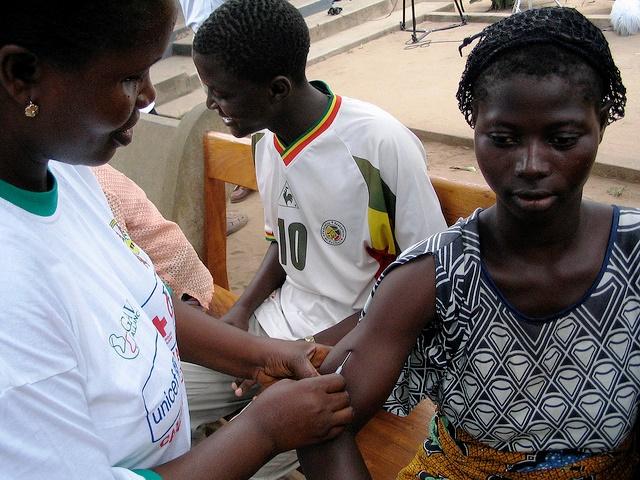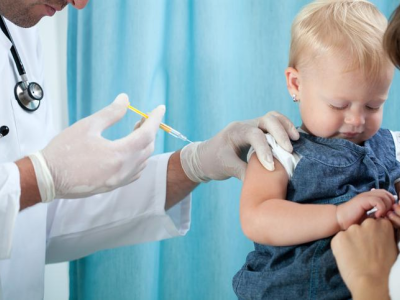African countries that will host phase 2 clinical trials of one of the leading candidate Ebola vaccines have asked GSK, the manufacturer, for more information, which means the trials most likely will start in February, the World Health Organization (WHO) announced today. That contrasts with some earlier predictions, which had said trials could start as early as this month or January.
The request for more documentation came during a meeting Dec 15 and 16 to review the application to launch phase 2 trials of the ChAd3 vaccine, developed by GSK and the US National Institutes of Health, the WHO said in a statement.
"The submission of additional information, and subsequent review by the countries planning to host the trials, is expected to take place by the end of January," the WHO said. "If these steps are completed to the satisfaction of the national authorities, Phase II trials are likely to begin in February."
ChAd3, which involves a chimpanzee adenovirus with Ebola genetic material spliced into it, is one of the two leading candidate Ebola vaccines. The other one, called VSV-EBOV, was created by the Canadian government and is now being developed by Merck in partnership with Iowa-based NewLink Genetics.
In October, amid a major push to speed the development of Ebola vaccines, top WHO officials had suggested that large efficacy trials of the leading vaccine candidates could begin as early as December or January, in the hope that a vaccine might contribute to slowing the Ebola epidemic.
Very small phase 1 trials of the vaccines' safety and immunogenicity are currently in progress, and in recent weeks officials have reported promising preliminary safety findings for both.
The WHO said the meeting was attended by regulatory and ethics officials from the countries considering hosting the phase 2 trials: Cameroon, Ghana, Mali, Nigeria, and Senegal. Also present as observers were officials from the three countries hard-hit by Ebola: Guinea, Liberia, and Sierra Leone.
The WHO statement did not reveal what kind of information the potential host countries requested from GSK.
Chinese vaccine
In other vaccine developments, Reuters reported today that China has approved clinical trials of a candidate Ebola vaccine developed by China's Academy of Military Medical Sciences.
China's state news agency, Xinhua, said the approval means China's vaccine would become the third Ebola vaccine to enter clinical trials, according to Reuters. Xinhua did not say when the trials would start, but other Chinese media said they would start this month.
The Chinese biotechnology firm Tianjin CanSino Biotechnology Inc. is also involved in developing the vaccine, Xinhua said.
Possible Merck windfall
Meanwhile, a bill signed by President Obama this week could mean a windfall for Merck if it succeeds in bringing its Ebola vaccine to market and could also change the economics of developing Ebola countermeasures, according to a Canadian Press report today.
The legislation says companies that get an Ebola vaccine or drug licensed in the United States are eligible for a priority review voucher from the Food and Drug Administration (FDA), which amounts to an FDA promise to quickly process—within 6 months—a future drug or vaccine license application, the story said.
A priority review voucher doesn't guarantee that a product will be approved, because that decision is based on its safety and effectiveness. But if a product wins approval, the voucher can be worth a lot because it means the product can be brought to market sooner, according to the story.
In November, Merck paid NewLink Genetics $50 million for the license to develop the VSV-EBOV vaccine. Observers of the priority review program said a voucher could be worth more than double that amount to Merck.
The priority review voucher program was launched in 2007 in an effort to tempt pharmaceutical companies to develop countermeasures for diseases that normally wouldn't attract industry interest because of dim prospects for profits, the story said.
The report said it appears that only four priority review vouchers have been issued so far, and that two of those have been sold. The first one brought a price of $67.5 million in July of this year, and the second garnered $125 million last month.
Some critics fault the program because it doesn't require the company that gets a voucher to actually sell the drug, nor does it require that a company seeking a voucher to do the necessary research itself, according to the story.
UN chief visits Ebola countries
In other news, United Nations Secretary-General Ban Ki-moon began a visit to the Ebola-stricken countries today, the UN Mission for Ebola Emergency Response (UNMEER) said.
"I want to see the response for myself, and show my solidarity with those affected and urge even greater global action," Ban said before leaving New York, according to UNMEER. "The Ebola response strategy is working, and we are beginning to see improvements. But now is not the time to ease up on our efforts. As long as there is one case of Ebola, the risk remains."
Ban is being accompanied on the visit by other top officials, including WHO Director-General Margaret Chan, MD, MPH, the UNMEER statement said.
Leading doctor dies in Sierra Leone
Meanwhile, Sierra Leone's leading doctor, Victor Willoughby, succumbed to Ebola today, hours after the arrival in the country of an experimental drug that could have been used to treat him, according to another Reuters story.
Willoughby was diagnosed as having Ebola last week after he treated a man with organ-related problems who was later found to have Ebola and died, the story said.
Willoughby's death brings to 12 the number of Sierra Leonean doctors who have contracted the virus, and 11 of them have died, Reuters reported. In all, the story said, 142 health workers in the country have been infected with the disease and 109 have died, according to WHO figures.
Sierra Leone's chief medical officer, Brima Kargbo, said the experimental drug ZMab, in frozen form, was flown to the country overnight. But before the drug could thaw, Willoughby's condition deteriorated, the story said.
See also:
Dec 18 WHO statement on vaccine meeting
Dec 18 Reuters story on Chinese vaccine
Dec 18 Canadian Press story on FDA review voucher
Dec 18 UNMEER update
Dec 18 Reuters story on death of doctor



















